The regional order is evolving fast, but it may not head the direction the US and Israel wishes.
The regional order is evolving fast, but it may not head the direction the US and Israel wishes.
By Mohammed Sabreen, from Cairo / Egypt
The moment seems fleeting, and the allure of reshaping the regional order in the Middle East to Israel’s advantage hangs heavy in the air. But if the past is any indication of what is to come, Israel’s attempt to eliminate all its adversaries will not end well.
Undoubtedly, the regional order in the Middle East is evolving rapidly, but not in the way many Israeli and American officials assume. This is at least the view of writer Marc Lynch in the American magazine Foreign Affairs.
Although the ceasefire agreement in Gaza appears to be holding, the situation in Gaza afterward remains uncertain and unclear.
The latest obstacles concern the administration of Gaza and the maintenance of security: who will be responsible for this, whether it will be Palestinian or foreign, what their mandate will be, what legitimacy they will possess, and whether the security force will be for maintaining security and peace or for imposing peace and disarming by force. In recent hours, news has leaked about a multinational force in Gaza, and Israel has threatened to continue its aggression against Gaza. All of this seems connected to the New Middle East project and normalization with Israel. What are the prospects for these proposals in the coming days?
Multinational Force
A source familiar with the matter told CNN that the Trump administration is working on a draft UN Security Council resolution to deploy a multinational force to Gaza to support the ceasefire agreement brokered by the United States.
The source added that details of forming a temporary security force responsible for disarmament in Gaza and training a new Palestinian police force are being discussed as part of the draft resolution.
Egypt Warns, Palestinians Will Not Accept
The head of the Egyptian State Information Service, Diaa Rashwan, stated that US President Donald Trump’s plan for the Gaza Strip separates the administration of the Gaza Strip from the international stabilization force.
In televised remarks, he added that the stabilization force in Gaza is a military force tasked with separating Israel from the Gaza Strip during the Israeli withdrawal and then securing the Gaza perimeter from within the Strip. He clarified that it is called a stabilization force, not a Gaza administration force, while another clause includes a peace council to oversee a committee that will manage the Strip.
He emphasized that conflating these two matters—the tasks of the military force and the administration of the Strip—is confusing. He considered the leaking of proposals regarding the force’s tasks, such as managing the Strip’s security and disarming the factions, into the US draft resolution currently before the Security Council not to pass them, but to provoke discussion.
He noted that Israel is setting conditions as if it had won the war on Gaza, while the Trump administration does not want to comply with all of these conditions. He pointed out that entrusting an international military force with disarming Hamas in Gaza would present it with a major dilemma and would lead to clashes. He argued that no state would accept confronting this matter because it could lead to armed clashes, noting that the trained Palestinian police would take over the administration of Gaza and that the best way to manage the affairs of the sector was for a committee of independents to take over the internal affairs.
He emphasized that Palestinians, whether in the Palestinian Authority or the resistance, would never accept a foreign security administration for the Gaza Strip, as this would amount to occupation instead of trusteeship.
Hamas responded to these reports by reiterating its rejection of any foreign security force assuming control of security in Gaza.
Hamas leader Mousa Abu Marzouk stated on Tuesday evening that it would be difficult for the Security Council to pass the resolution establishing an international force in Gaza according to the American proposal, noting that there was a Palestinian consensus that the security force in Gaza should be Palestinian, under the leadership of the committee managing the Strip.
“Military Zone”
Israeli Defense Minister Yisrael Katz declared the border area with Egypt a military zone. Katz held a discussion on the “drone threat” along the Israeli-Egyptian border and instructed the Israeli army to transform the border area into a “closed military zone.”
At the same time, Katz directed that the rules of engagement be amended to target any unauthorized individuals entering the restricted area, specifically drone operators and smugglers.
This decision followed months of large-scale arms smuggling operations, according to Hebrew media reports citing a Defense Ministry statement.
Katz stated that Israel will not stop until Hamas is completely disarmed in the Gaza Strip. He added that Israeli policy, and the army’s efforts, are focused on destroying tunnels and eliminating Hamas terrorists without any restrictions within the “yellow zone” under Israeli control. The goal, in addition to recovering all the bodies of the deceased hostages, is the disarmament of Hamas and the demilitarization of Gaza.
Popular Rejection of Normalization
It seems unlikely that Washington’s efforts to bring Israel closer to its neighbors will yield any significant breakthroughs anytime soon. This is despite Trump’s attempts to expand normalization agreements to include other Arab states, including Saudi Arabia and Lebanon.
Western experts assert that even assuming, for the sake of argument, that Arab leaders are unwilling to directly challenge Israel, they are also unprepared to face the popular backlash that could result from closer cooperation.
The experts point out that Saudi Arabia has issued numerous statements expressing its unwavering and steadfast support for the establishment of a Palestinian state, a position it has described as non-negotiable and non-negotiable. It has emphasized that the establishment of an independent Palestinian state with Jerusalem as its capital is a prerequisite for establishing diplomatic relations with Israel.
Meanwhile, Egypt is proposing a plan for the reconstruction of Gaza, based on Arab-led reconstruction and the establishment of future security oversight of the territory. The Arab League unanimously approved the plan, a stark contrast to the Israeli and American vision of emptying Gaza of its inhabitants and seizing control of the territory. Its aim was to garner popular support for Arab governments, responding to their people’s demands for decisive and urgent action.
While the actions taken by Arab governments, such as Morocco’s cancellation of Netanyahu’s 2024 visit, may not constitute a dramatic split, Western experts argue they have hindered Israel’s integration into the region, a key objective of the normalization agreements.
It is not merely that Arab citizens have rallied in support of the people of Gaza; their efforts are also altering regional dynamics in ways that challenge American and Israeli interests. As long as Arab populations perceive American and Western policies toward Israel as based on double standards and impunity, this confrontation is likely to persist. If Israel’s campaign against Gaza continues, along with its efforts to forcibly displace the Gazan population, popular Arab rejection of normalization with the racist occupying state is likely to intensify.
A major breakthrough, but…
President Donald Trump’s efforts to end the war in Gaza have resulted in the release of all surviving Israeli captives and a lull in the relentless killing and destruction that have plagued the territory.
This breakthrough has raised hopes for a broader regional shift, even if what comes after the initial ceasefire remains largely uncertain. Trump himself speaks of a dawn of peace in the Middle East. If his deal prevents the expulsion of Palestinians from Gaza and the annexation of the West Bank, many Arab governments may once again look to explore normalization with Israel. Indeed, Israelis have seen how Arab leaders pressured Hamas to accept Trump’s deal as evidence that normalization could return to the negotiating table.
But even if the Gaza agreement holds, this moment of US-Israeli rapprochement will not last. Israel’s mistaken belief that it has achieved permanent strategic superiority over its adversaries will likely lead it to take increasingly provocative actions that directly challenge the White House’s objectives. The Gulf states that Israel dreams of annexing are skeptical of its willingness or ability to protect its core interests. These countries are now less interested in confronting Iran and less convinced that the road to Washington leads through Tel Aviv. Israel, it seems, is unaware of the extent of Trump’s rapprochement with the Gulf states.
Wishful Thinking
Wishful thinking has permeated the Israeli government and national security establishment, which have relished the opportunities afforded by the country’s exercise of power. Following the Hamas attacks of October 7, 2013, Israel embarked on a series of airstrikes and interventions in the region targeting not only Hamas but the entire Iranian-led axis, repeatedly crossing the red lines that had long governed the regional shadow war. These strikes resulted in the deaths of leaders once considered untouchable: Hezbollah Secretary-General Hassan Nasrallah with a massive bomb dropped in central Beirut; Hamas political leader Ismail Haniyeh in an Iranian safe house; numerous Iranian military commanders in Syria; and the Houthi prime minister in Yemen. Its bombing of Iranian nuclear and military sites represented the culmination of Israel’s long-held desire to strike at the heart of its greatest enemy. However, the attack in the Gulf proved to be a sudden turning point. Israel’s shocking attempt to assassinate Hamas leaders meeting in Doha for US-mediated negotiations in September represented a dramatic escalation in its efforts to reshape the Middle East through air power. This kind of maneuvering was typically undertaken only by leaders convinced of their impunity. But Trump decided that Israel had crossed a line this time. The indelible image of a scowling Trump watching Israeli Prime Minister Benjamin Netanyahu timidly read a written apology during a phone call with the Emir of Qatar seems emblematic of the shifting geopolitical moment that led to the initial ceasefire in Gaza.
It is unclear whether Trump’s anger at Israel will produce any fundamental changes beyond the ceasefire. The Israeli military resumed bombing parts of the Strip this week, citing alleged Hamas attacks in southern Gaza. Israel would be wise to step back from the brink and seize the opportunity presented by the ceasefire to scale back its military adventures and pursue a sustainable regional order, which can only be achieved through serious progress toward a Palestinian state. The protracted conflict has exposed Israel’s weaknesses: its missile defenses do not provide absolute security, its economy cannot sustain endless war, its domestic politics are strained after a prolonged conflict in Gaza, and its military remains heavily dependent on the United States. The devastation of Gaza has shattered Israel’s standing in the world, leaving it increasingly isolated and alone.
Israel cannot
Israel cannot usher in a new, stable Middle East order through bombing. Regional leadership requires more than military superiority; it also demands a degree of consent and cooperation from other regional powers. But no one in the Middle East wants to lead Israel, and all states now increasingly fear its unchecked power. Some in Washington celebrate the prospect of Israel, unchecked, inflicting significant damage on America’s adversaries. But they should be careful what they wish for. Israel’s interests diverge from those of the United States, and Israel writes many checks that the United States may be unwilling or unable to cash.
The Future Order
Israel’s efforts to reshape the region have exceeded many people’s expectations, but they are swimming against the tide. The regional order in the Middle East has been remarkably stable over the past 35 years. Despite seemingly constant turmoil, violence, and upheaval, the basic structure of regional politics has experienced only a few moments of potential change, none of which lasted long. This structure consists of a tense, unpopular, and largely undesirable American hegemony internationally, and a very strong, though sometimes acknowledged, division of the region into two competing blocs.
Searching for an Alternative
American supremacy, weakened by the disastrous US invasion of Iraq and the 2008 global financial crisis, no longer appears as solid as it did in previous decades. But multipolarity remains a distant prospect.
Russia once had only one ally in the region: the weakened regime of President Bashar al-Assad in Syria. Now, after Assad’s overthrow in 2024, it has no ally left.
China’s continued economic rise and its vast array of strategic agreements with regional powers have not translated into any serious challenge to the US-led regional order. Beijing has been largely invisible in Gaza, merely condemning the Israeli and US bombing of Iran.
China maintains only one naval base in the region, a small outpost in Djibouti used for anti-piracy efforts in the Gulf of Aden, but it did nothing when the Houthis blockaded shipping in the Red Sea in retaliation for Israel’s Gaza campaign.
For now, China seems content to benefit from the free rein of US military dominance in the Gulf, despite its dependence on Middle Eastern oil and gas. Despite the efforts of countries in the region to diversify their military and economic partnerships and to conclude more favorable deals with Washington, no alternative to American hegemony has yet emerged.
What kind of system was it?
Since 1991, the entire Middle East has settled into a functionally bipolar regional system, with a US-led bloc comprising Israel, most Arab states, and Turkey, facing off against Iran and its regional partners. Gulf leaders are comfortable with Trump’s transactional approach and his penchant for the kind of deals that wealthy oil-producing states can readily offer. The Abraham Accords, under which several Arab states normalized relations with Israel in 2020 at Trump’s behest, changed little beyond the surface; many of these Arab states have long maintained strategic ties with Israel against Iran.
This US-led system has proven remarkably resilient. The collapse of the Israeli-Palestinian peace process in 2001 and the Second Intifada did not disrupt it in any meaningful way. Nor did the 9/11 attacks, the disastrous invasion of Iraq, or the pursuit of highly unpopular policies in the name of the “Global War on Terror.” These disasters have, in fact, strengthened the Iranian bloc, which for decades has appeared to be steadily rising as its allies have gained dominance in Baghdad, Beirut, and Sana’a. The Assad regime clung to power in Damascus; and Hamas and Hezbollah developed massive arsenals of missiles and other military capabilities.
A Destructive Rivalry
During the upheavals of the post-2011 Arab Spring, the bipolar world order transformed into something resembling a tripolar one. The Iranian-led axis of resistance largely held its ground. But the threats and opportunities presented by these profound political shifts fueled a highly destructive rivalry across multiple regional fronts, effectively splitting the US-led coalition into two camps: Qatar and Turkey on one side, and Saudi Arabia and the UAE on the other. Washington struggled to keep them aligned on common goals. The Saudi-Emirati blockade of Qatar from 2017 to 2021 severely hampered efforts to maintain a united front against Iran.
This ill-fated rift was quickly resolved with the inauguration of US President Joe Biden, as the major parties reconciled and the traditional order was restored, despite the Biden administration’s failed attempt to broker an Israeli-Saudi normalization agreement.
The Depth of Public Anger
However, in the wake of the Gaza war, Arab regimes have rediscovered their interest in the Palestinian cause. Their leaders, ever fearful of a renewed wave of popular uprisings and carefully preparing for potential triggers of new protests, are acutely aware of the depth of public anger over the ethnic cleansing and destruction of Gaza. Saudi Arabia’s renewed endorsement of the Arab Peace Initiative, which conditions peace with Israel on the establishment of a Palestinian state, demonstrates the strength of this shift. This shift was reflected in the terms of the Gaza ceasefire, which ruled out the expulsion of Palestinians and Israeli annexation of the territory—terms more closely aligned with Gulf preferences than with those of Israel.
Israel’s Missed Moment
Yet, this shift has escaped the notice of Israeli leaders. They are instead focused on how Israel’s campaign against Iran and its allies has fundamentally altered the balance of power in the region. Eliminating Hezbollah’s leadership and destroying a significant portion of its missile arsenal has removed one of Iran’s most vital military assets. The fall of the Assad regime deprived Tehran of an easy path to rebuild its Lebanese ally, while Israel systematically destroyed the Syrian military arsenal, attacked Iranian assets in the country, and claimed de facto sovereignty over a large swath of southern Syria.
Imposing Order by Force
Israeli national security thinkers and officials believe that every escalation has proven the critics’ fears exaggerated. They now insist that their mistake, before October 7, was allowing threats to fester without responding decisively, whatever the cost. Their gamble now is that order can be imposed by force and from the air, and that Arab leaders are either too afraid or too weak to risk retaliation.
Israel seems convinced that normative concerns don’t matter much: legitimacy, as its actions demonstrate, simply affects it. Arab leaders may grumble, but ultimately they will fall in line with the rising regional hegemon. Israel has always been the most pragmatic of the regional powers. It prefers a region where might makes right, where no self-serving state sacrifices its interests for the Palestinians, where international law is not binding on anyone, and where military might prevail.
But Israeli military superiority and rising Arab discontent will not create a sustainable order. Consolidating Israeli regional leadership requires Arab states to share either a sense of purpose or a sense of threat with Israel, and Israel has undermined both. The destruction of Gaza and moves toward annexing the West Bank have eroded any pretense of Israeli willingness to allow a path to a just solution to the Palestinian statehood issue. Even before Israeli attacks decimated Iran’s regional military power, Saudi Arabia and the Gulf states were moving toward rapprochement with the Islamic Republic. This shift was further reinforced by the attack on Doha and, prior to that, by Israeli threats to expel millions of Palestinians to Egypt and Jordan. Israel now appears as much of a threat to Arab regimes as a weakened Iran, and Arab states will be less inclined to accept an unpalatable alliance with Israel if the Iranian threat no longer keeps them on their toes.
Unbridled Power Leads to Tragedy
Israel has clearly demonstrated its unwillingness to take any serious steps toward building a shared sense of purpose that might allow it to translate its military success into regional leadership. Israelis remain deeply traumatized by the October 7 offensive. A large majority of the Israeli public rejects international condemnation of Israel’s war crimes in Gaza, and most simply refuse to believe reports of famine or mass civilian casualties. Netanyahu is more concerned with preserving his narrow, far-right government than with addressing international criticism and reviving the Palestinian statehood plans that are anathema to his coalition partners. The Gaza ceasefire offered an opportunity to change course, but the ongoing skirmishes, the continued obstruction of humanitarian aid, and the escalating settler violence in the West Bank do not bode well.
Overestimating Israel’s Power
To make matters worse, Israel also overestimates its military strength. Despite its audacious surprise attacks and clear air superiority, Israel does not possess an army capable of occupying territory beyond the Palestinian and Syrian lands it occupied 55 years ago. It has demonstrated its ability to achieve many of its tactical objectives through assassinations and long-range bombing. However, it has failed to achieve any of its strategic goals: Hamas remains the dominant force in Gaza, Hezbollah refuses to disarm despite suffering heavy losses, and the massive 12-day military campaign against Iran failed to end the Iranian nuclear program or inspire Iranians to revolt and overthrow the Islamic Republic.
Israeli Hegemony Is Conditional
Israel could only sustain its war on Gaza with continued US munitions. The Iron Dome’s defenses against Iranian missile attacks were dangerously degraded in terms of interceptor missiles before the US imposed a ceasefire in the 12-day war. Israel’s repeated appeals to Washington over the past two years reveal the country’s deep dependence on the United States. Regional powers have undoubtedly recognized this potential vulnerability in a protracted conflict.
Netanyahu has been playing the American political game for decades, and he has good reason to assume that Israel’s control over US policy will continue indefinitely despite the current turmoil. But warning signs are beginning to emerge.
Netanyahu’s partisan embrace of the Republicans and Israel’s conduct in Gaza have severely undermined what was once a bipartisan consensus in favor of Israel. A majority of Democrats now sympathize more with the Palestinians than with the Israelis, and Democratic politicians are increasingly skeptical of military aid to Israel. While Republicans continue to support Israel, nationalists within the “America First” camp appear less willing to subordinate U.S. interests to those of Israel. Trump is elderly, unpredictable, and volatile, with deep personal and financial ties to the Gulf states; his likely Republican successors, such as Vice President J.D. Vance, have no particular commitment to Israel. Without a blank check from the United States, Israel’s supremacy could evaporate more quickly than anyone anticipates.
Less Useful
Israel may see itself as the new dominant power in the region, but in reality, it has made itself less indispensable and less useful. After the attack on Qatar, it is unlikely that Gulf leaders will continue to direct all their air defense systems toward Iran and Yemen. They might accept Israel wiping out Gaza, but Israel has now made itself a threat to their security. Israel’s avoidance of paying any significant price so far for its military expansion in the region and the destruction of Gaza has fueled the feeling in Israel that it will never pay a heavy price. But this is as misleading as the Israeli belief in 1973 that no Arab state would dare attack it again after its crushing victory six years earlier, or its notion, prior to October 7, 2023, that Hamas would remain forever confined to Gaza.
Israel, Not Iran
It is now clear that a conviction is forming in the corridors of many countries that Israel bears responsibility for destabilizing the Middle East, and many politicians and experts are calling for a comprehensive security approach that includes all countries in the region. Perhaps the latest voice to express this conviction is that of the Sultanate of Oman. Its Foreign Minister, Badr Al-Busaidi, affirmed that “Israel, not Iran, is the primary source of insecurity in the region,” noting that “Israel’s deliberate practices to prolong tension have resulted in the deaths of hundreds of innocent Iranian civilians,” according to the Oman News Agency.
During his recent participation in the Manama Dialogue 2025, hosted by Bahrain in cooperation with the International Institute for Strategic Studies (IISS), Al-Busaidi emphasized that “true security is not built on policies of isolation, containment, or exclusion, but rather on inclusivity and positive engagement among the countries of the region.” The Omani minister explained that “Iran nevertheless responded with remarkable restraint, just as it did when Israel bombed its consulate in Syria, wounded its ambassador in Lebanon, and assassinated a senior Palestinian negotiator in Tehran.”
Al-Busaidi added that “such acts of sabotage constitute a serious violation of international law and clearly demonstrate that Israel, not Iran, is the primary source of insecurity in the region.”
Lies and Illusions
The Middle East has changed. It is clear that Washington is no longer the dominant global power, and Israel is now merely a source of threat to the region. The Iranian threat has diminished, and anger against the racist occupation state has risen in the streets of Arab, European, and American cities. Many, like Robert Malley and Hussein Agha in Foreign Affairs magazine, are now talking about “the lies America tells itself about the Middle East.” Malley argues that with its declining influence in the region, Washington has resorted to deception and denial of reality, and will do nothing about what might happen there except watch the destruction. The authors emphasize that American deception is not new; its roots predate the Al-Aqsa War and extend beyond the conflict with the occupation state. They point out that this deception has become habitual, and that for decades, America has misled the world about its position on the conflict, pretending to be a mediator while in reality it is a biased party. The authors note that lies are born of failure and thrive on its repetition.
The Middle East remains a region that has changed. On the other hand, we Arabs see that there is a widespread conviction of the need to end wars and impose solutions to the explosive conflicts in the region. Arab and Islamic countries, foremost among them Egypt, realize that the issues are intertwined, and that there must be permanent and just solutions to the Palestinian issue, which is the core of everything. Cairo, with its long experience, realizes that “crisis management” is a recipe for exploding them later. And now, for a rare occasion, the moment seems ripe for a security framework for the region, provided that solutions are imposed first on the chronic issues.








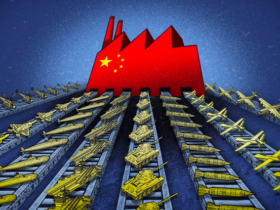
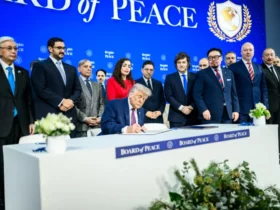
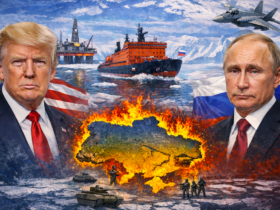

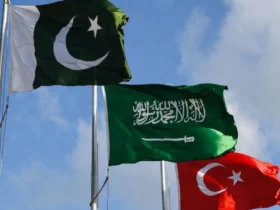
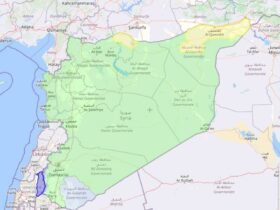

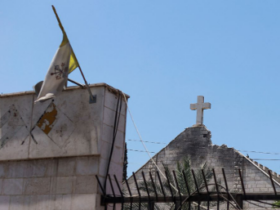

Leave a Reply